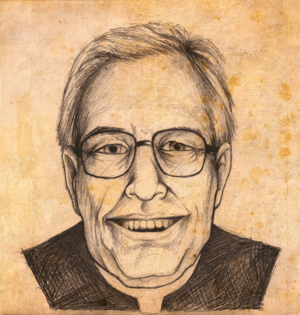Narcís Jubany Arnau facts for kids
Quick facts for kids Narciso Jubany Arnau |
|
|---|---|
| Archbishop Emeritus of Barcelona | |
 |
|
| Church | Roman Catholic Church |
| Archdiocese | Barcelona |
| See | Barcelona |
| Appointed | 3 December 1971 |
| Reign ended | 23 March 1990 |
| Predecessor | Marcelo González Martín |
| Successor | Ricardo María Carles Gordó |
| Other posts | Cardinal-Priest of San Lorenzo in Damaso (1973–96) |
| Orders | |
| Ordination | 30 July 1939 |
| Consecration | 22 January 1956 by Ildebrando Antoniutti |
| Created Cardinal | 5 March 1973 |
| Rank | Cardinal-Priest |
| Personal details | |
| Birth name | Narciso Jubany Arnau |
| Born | 12 August 1913 Santa Coloma de Farnés, Spain |
| Died | 26 December 1996 (aged 83) Barcelona, Spain |
| Previous post |
|
| Alma mater | Pontifical Gregorian University |
| Motto | Ut veritas evangelii permaneat |
| Coat of arms |  |
| Styles of Narcís Jubany Arnau |
|
|---|---|
 |
|
| Reference style | His Eminence |
| Spoken style | Your Eminence |
| Informal style | Cardinal |
| See | Barcelona (emeritus) |
Narcís Jubany Arnau (born August 12, 1913 – died December 26, 1996) was an important Spanish Cardinal. A Cardinal is a high-ranking leader in the Roman Catholic Church. He was the Archbishop of Barcelona from 1971 to 1993. He became a Cardinal in 1973.
Contents
Early Life and Education
Narcís Jubany Arnau was born in Santa Coloma de Farners, Spain. His family was working-class. When he was 13, he moved to Barcelona. There, he began studying at a seminary. A seminary is a school where people train to become priests.
He continued his studies at the Pontifical University of Comillas. He earned a special degree called a doctorate in theology. He also studied in Rome at the Pontifical Gregorian University. There, he earned another doctorate in canon law. Canon law is the set of rules and laws of the Catholic Church.
Becoming a Priest and Bishop
Narcís Jubany Arnau became a priest on July 30, 1939. After his studies, he worked in churches in Barcelona. He also taught at the seminary. He served as an official in the church's legal court. He was also a cathedral canon, which is a type of priest linked to a cathedral.
On November 24, 1955, he was chosen for a new role. Pope Pius XII appointed him as an Auxiliary Bishop of Barcelona. This means he helped the main bishop. He also became the Titular Bishop of Orthosias in Phoenicia.
He officially became a bishop on January 22, 1956. This event is called an episcopal consecration. It took place in the Cathedral of Barcelona.
Important Church Roles
From 1962 to 1965, Bishop Jubany attended the Second Vatican Council. This was a very important meeting of Catholic leaders from all over the world. During this time, on February 7, 1965, he became the Bishop of Girona.
Later, on December 3, 1971, he was named the Archbishop of Barcelona. This was a very significant leadership position.
Becoming a Cardinal
On March 5, 1973, Pope Paul VI made him a Cardinal Priest. This happened during a special ceremony called a consistory. As a Cardinal, he became a member of important church groups. These groups helped make decisions for the Church.
Role in Spain's Transition
After Generalissimo Francisco Franco died in 1975, Spain went through a big change. It moved from being a dictatorship to a democracy. Cardinal Jubany played a key role during this time. He encouraged discussions among different political groups. He supported democracy and showed openness to new ideas.
He also took part in two important meetings in 1978. These meetings, called conclaves, were held to choose new Popes. He was one of the cardinal electors who chose Pope John Paul I and Pope John Paul II. He was known for wanting a Pope who was not from Italy.
Later Years and Legacy
Cardinal Jubany retired as Archbishop of Barcelona on March 23, 1990. He had served for eighteen years. When he turned 80 on August 12, 1993, he could no longer vote in future Papal conclaves.
He passed away in Barcelona at the age of 82. He is buried in the beautiful cathedral in Barcelona.
See also
 In Spanish: Narciso Jubany para niños
In Spanish: Narciso Jubany para niños
 | Janet Taylor Pickett |
 | Synthia Saint James |
 | Howardena Pindell |
 | Faith Ringgold |

